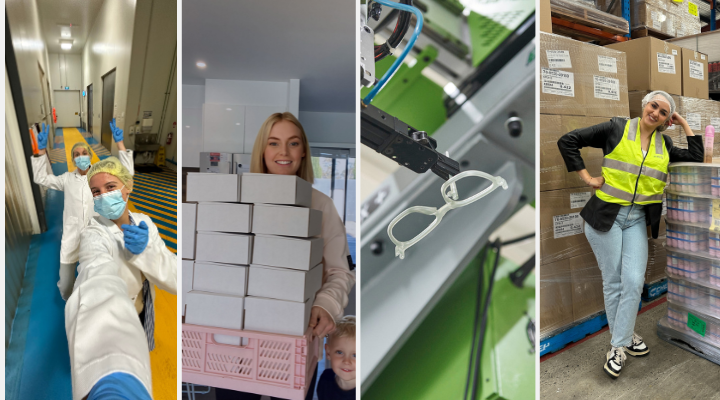
Manufacturing products isn’t easy if you’re a small business. In this piece, four founders spill everything they’ve learnt in the messy, make-or-break world of small-biz manufacturing.
Finding the right manufacturer – Effect Beauty Co
Finding a manufacturer who would make her products to standard was an uphill battle for lash-maker Taneia Hill. Taneia wanted her false eyelashes brand, Effect Beauty Co, to be known for quality, long-lasting and easy-to-apply products. In other words, she wanted to give her customers a perfect product – something she knew from personal experience was crucial.
“Being a beauty product-based business, if a customer buys a product and it doesn’t work, they just don’t buy it again, even if [the business] redevelops it,” she explains.
Unfortunately, many manufacturers weren’t willing to adjust the products they already had to fit her exacting needs. When Taneia did find one willing to meet her criteria, the first sample was only about 80 per cent ‘there’ – and the second even less.
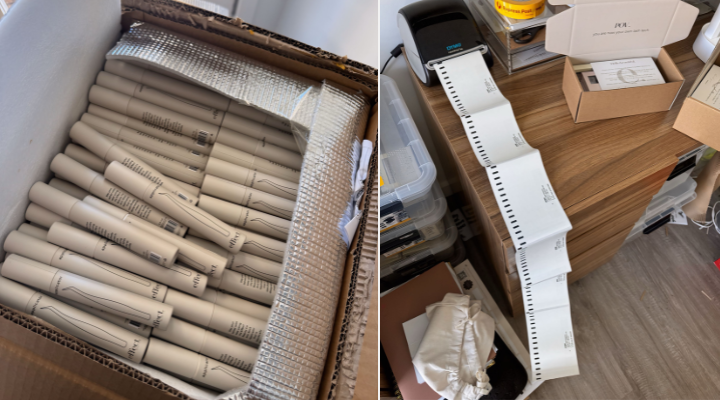
Taneia’s sleek products have been a long time in the making.
Compounding the situation was her own lack of confidence and experience.
“I trusted too soon,” Taneia says. “And I also didn’t have the confidence to negotiate the order criteria – minimum order quantity, sample costs and all those kinds of things.”
Once Taneia finally landed on the perfect products and packaging, the manufacturing process continued to be a challenge. Like any fledgling owner, the issue was often that she lacked the funds to pay for a bulk order. Establishing a good relationship with her manufacturers was the key to getting around this; allowing the business owner to negotiate paying a percentage and get the rest of the cash together during the six- to eight-week production process.
Her biggest piece of advice for building a good relationship with a manufacturer? Honesty and frequent communication.
“[The best way] is by building trust and being honest. Like just saying I don’t have the funds to pay up front, instead of ghosting them until I had the money,” Taneia explains. “I also speak to them about upcoming orders and fulfilments that I’m going to need as the brand grows… They’re a business as well, they also want to grow and have sales.”
Taneia is on her third supplier, which she found when it reached out to her after discovering her business on Instagram. One green flag about this company was the breadth of information in their initial email on how and what they produced; they also provided free samples.
Though she has a great relationship with this company, she advises other businesses not to trust too easily or too unconditionally. If a manufacturer doesn’t align with where you see your business going, she says, it’s probably time to move on.
“And always get final samples before sending an order in bulk,” she adds. (At one point, a bulk order was made entirely in the wrong colour. Not all was lost – Taneia repackaged the stock as limited edition.)
Staying flexible and willing to learn – Mingle Seasoning
When Mingle Seasoning’s Jordyn Evans was looking for a manufacturer for her healthy seasoning brand, she relied heavily on her existing FMCG network for directions. The entrepreneur had previously worked as a marketing manager for a sparkling drinks brand, which gave her direct access to label manufacturers and bottle suppliers.
While the connections may have helped her in knowing where to go, Jordyn admits that it is just half of what helped her. “Honestly, in those early days, you’re just figuring things out as you go, so it’s really important to ask a lot of questions, stay humble, and leave your ego at the door,” she explains.
This willingness to learn led her to be part of the Chobani Incubator Program, where she not only got connected to the manufacturers, but also learned more about how to source packaging and labels that would be compatible with her equipment. This also came at the right time, as the business was scaling to a point that it was beginning to reach retail supermarkets.
Despite the breakthrough, Jordyn admits that the business journey on the manufacturing side has not always been smooth. The Covid-19 pandemic was a particularly challenging time.
“Some of our manufacturers temporarily shut down during this period, forcing us to quickly pivot and find alternative solutions,” she recalls. “It was tough, but it also taught us a lot about flexibility and resilience.”
Currently, Mingle Seasoning has one manufacturer that works for its online business. On the retail side, it is exploring opportunities with other manufacturers who can handle larger volumes and support upcoming product developments down the road.
Amidst the potential manufacturing shift, Jordyn says she has been fortunate to have as partners manufacturers who genuinely supported her when she was considered the underdog and is now sharing in the rewards of the business’s growth.
For Jordyn, the support manufacturers have given her is the result of giving importance to building a strong relationship with manufacturers, even if such business is in its infancy and is not yet handling large-volume orders. “Early on, manufacturers are essentially taking a leap of faith with you and your vision, so trust plays a massive role,” she explains. “Maintaining this relationship boils down to consistent and transparent communication, fairness, flexibility – especially during hectic or challenging times – and meticulous planning.”
A testament to her relationship with one manufacturer was its quick response to a spike in demand. After a viral TikTok video ran Jordyn’s stock dry, they worked overtime to keep up.
“(We were) literally begging them to run extra shifts over the weekend to replenish stock as quickly as possible,” she says. “Thankfully, they pulled through for us, and we’ve now got stock steadily filtering back onto shelves. Moments like these reinforce the importance of having strong, reliable manufacturing partnerships and being agile enough to respond swiftly when challenges arise.”
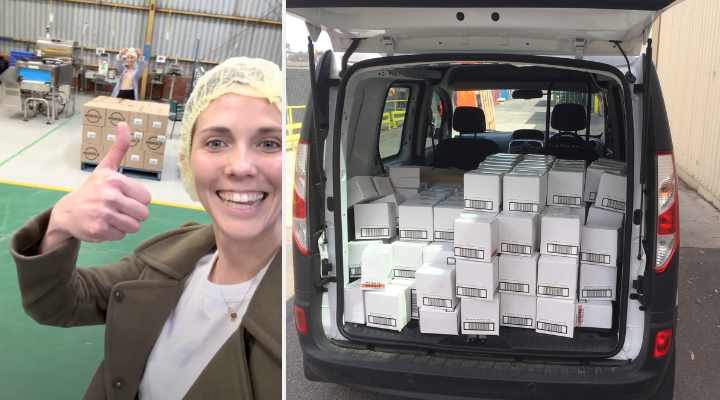
A behind-the-scenes glimpse at Mingle Seasonings’ operations.
A lesson in quality control – The Quick Flick
The manufacturing journey for eyeliner stamp brand Quick Flick was a surprisingly straightforward one for founder Iris Smit, as she found her product’s potential manufacturers.
Iris Smit of the Quick Flick learned an important lesson the hard way on her manufacturing journey. Iris’s business produces eyeliner stamps – because the item was unknown to the public as her brand emerged, every bit of its presentation mattered, to make a good first impression.
“I had approved a sample, paid the full amount to the supplier, and had the goods shipped to our warehouse,” Iris recounts. “Unfortunately, when the order arrived, the artwork was warped, rendering the entire batch unusable. To make matters worse, the supplier ghosted me after I raised the issue, leaving me out of pocket and without product.”
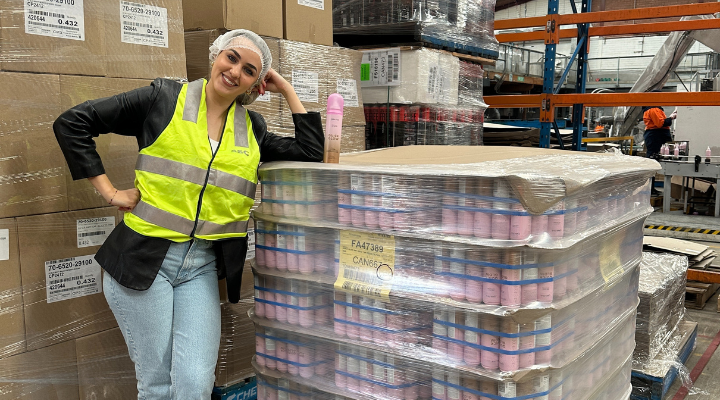
Good manufacturing partnerships have been a crucial part of the Quick Flick’s success.
Iris has since tightened quality control – not just of the products before shipping but also on the suppliers she works with.
As the business grew, Iris decided to pivot from the original manufacturer and diversify manufacturer partnerships as a means of minimising potential risks. This proved to be beneficial when the Covid-19 pandemic hit and disrupted manufacturing operations globally.
“Because we had multiple manufacturing relationships in place, we were able to maintain production even when some suppliers were unable to operate,” Iris says.
And in maintaining these multiple manufacturing partnerships, Iris says she realised the importance of recognising that manufacturers are running a business as well and that building a harmonious partnership is critical to the success of both businesses.
“By working together as a team, we ensure that both businesses can thrive,” she says. “It has been crucial to involve them deeply in our vision and mission, getting them excited about being part of our journey.”
2503 attempts in the making – Good Citizens Eyewear
Jocelyne Simpson and Nik Robinson had an idea that had never been attempted before: Creating a pair of eyewear frames from single-use plastic. They decided to call the business Good Citizens Eyewear – but finding a manufacturer who could turn their idea into reality was a challenge.
For one, they preferred to work with local manufacturers to communicate and solve problems with them in real time. But local manufacturers said that using Pet plastic for eyewear was impossible. “No one had any experience or the right machines,” Nik recalls.
Eventually he was able to get in touch with a factory which believed in their mission to “untrash the planet.” It was a lengthy process, taking 2503 attempts over 752 days, before the first pair of successful glasses. Despite the time it took, this has helped Nik and Jocelyne perfect the formulation for the product. “We have a bible of how we overcame those challenges,” Nik shares. “That’s our intellectual property and we safeguard it with our lives.”
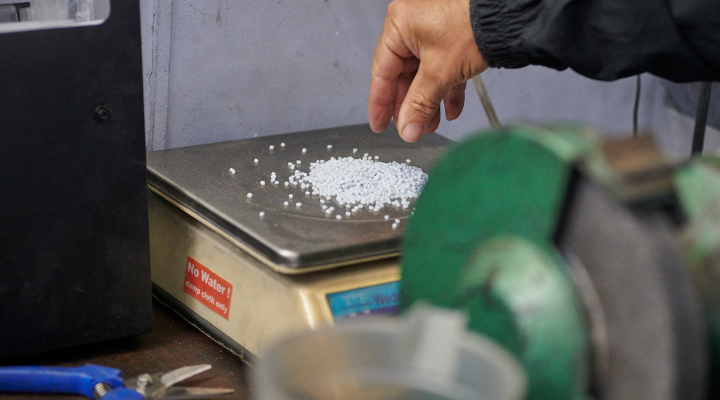
Recycling plastic into glasses is a highly intricate process.
Good Citizens Eyewear would remain with this manufacturing partner for the next three years until change in production methods required them to use a specific type of machine that their manufacturer was not able to provide. The business had to move production to a new manufacturer. It was a reluctant decision – and though it ended up improving the product, challenges remain.
“These [new] machines are much more suited to our product and so the results on the whole are better,” Nik shares. “But even with the new setup, we encounter daily challenges because of the 100 per cent recycled plastic.”
Jocelyne and Nik have always enjoyed positive manufacturer relationships – Nik says they even still call on the first supplier for advice and support. But it hasn’t always been a smooth ride.
“It’s always been an excellent but interesting relationship. We’re the ultimate pain-in-the-arse client for them,” he admits. This is due to the complexity of manufacturing the product and the plastics it uses.
“Unlike 100 per cent virgin plastic, which is easy to manufacture with… every batch comes from different bottles with variations and that means we can’t just set up the machines to run on their own,” he explains. “We’re in the factory for every production run, working alongside the team, documenting and problem-solving on the fly. We quality-check every pair ourselves. It can get very, very tense at times, so how we treat each other is key. I do my best to keep everyone positive and motivated.”
Despite these challenges, the business and the manufacturers have an immense sense of pride in creating Good Citizens Eyewear products. ”All these challenges are worth overcoming because we see value in trash,” Nik explains. “Every time they see someone walking down the street in a pair of our glasses, they feel connected, knowing they made that product and are helping our greater mission to untrash the planet. It’s not just another product they make.”
 Small But Mighty
Small But Mighty